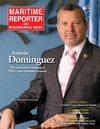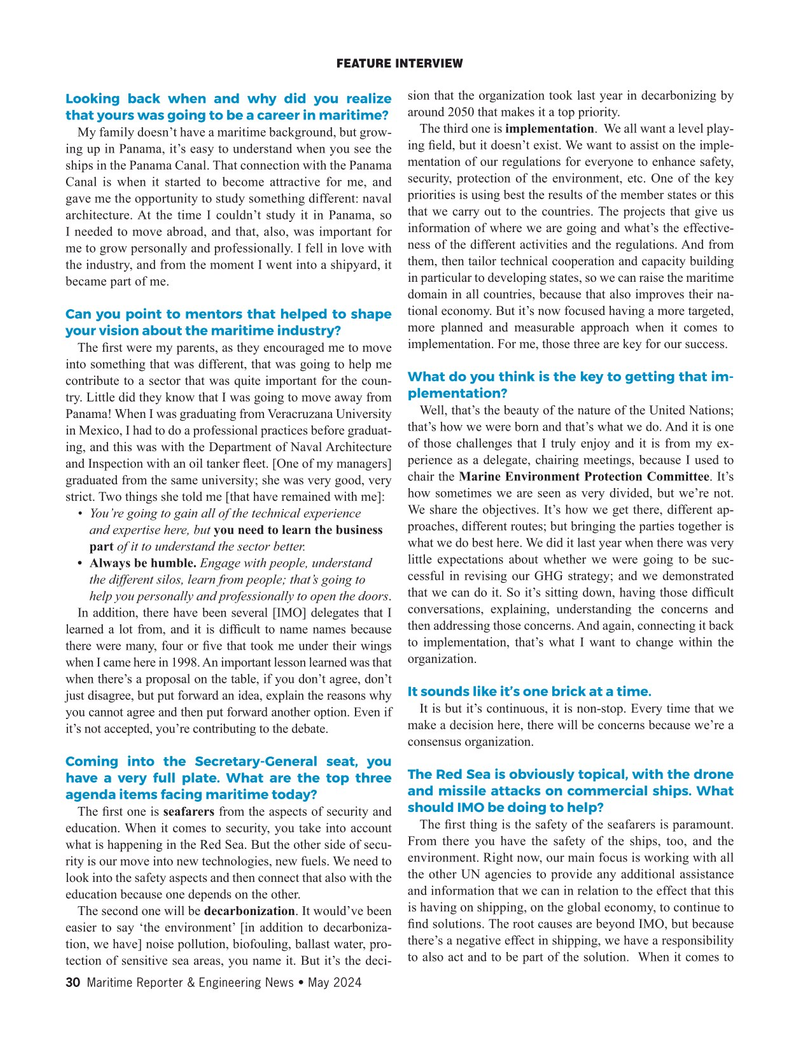
Page 30: of Maritime Reporter Magazine (May 2024)
Read this page in Pdf, Flash or Html5 edition of May 2024 Maritime Reporter Magazine
FEATURE INTERVIEW
Looking back when and why did you realize sion that the organization took last year in decarbonizing by around 2050 that makes it a top priority. that yours was going to be a career in maritime?
The third one is implementation. We all want a level play-
My family doesn’t have a maritime background, but grow- ing up in Panama, it’s easy to understand when you see the ing ? eld, but it doesn’t exist. We want to assist on the imple- mentation of our regulations for everyone to enhance safety, ships in the Panama Canal. That connection with the Panama
Canal is when it started to become attractive for me, and security, protection of the environment, etc. One of the key gave me the opportunity to study something different: naval priorities is using best the results of the member states or this architecture. At the time I couldn’t study it in Panama, so that we carry out to the countries. The projects that give us
I needed to move abroad, and that, also, was important for information of where we are going and what’s the effective- me to grow personally and professionally. I fell in love with ness of the different activities and the regulations. And from the industry, and from the moment I went into a shipyard, it them, then tailor technical cooperation and capacity building in particular to developing states, so we can raise the maritime became part of me.
domain in all countries, because that also improves their na-
Can you point to mentors that helped to shape tional economy. But it’s now focused having a more targeted, more planned and measurable approach when it comes to your vision about the maritime industry?
The ? rst were my parents, as they encouraged me to move implementation. For me, those three are key for our success. into something that was different, that was going to help me
What do you think is the key to getting that im- contribute to a sector that was quite important for the coun- try. Little did they know that I was going to move away from plementation?
Well, that’s the beauty of the nature of the United Nations;
Panama! When I was graduating from Veracruzana University that’s how we were born and that’s what we do. And it is one in Mexico, I had to do a professional practices before graduat- ing, and this was with the Department of Naval Architecture of those challenges that I truly enjoy and it is from my ex- and Inspection with an oil tanker ? eet. [One of my managers] perience as a delegate, chairing meetings, because I used to graduated from the same university; she was very good, very chair the Marine Environment Protection Committee. It’s how sometimes we are seen as very divided, but we’re not. strict. Two things she told me [that have remained with me]:
We share the objectives. It’s how we get there, different ap- • You’re going to gain all of the technical experience proaches, different routes; but bringing the parties together is and expertise here, but you need to learn the business what we do best here. We did it last year when there was very part of it to understand the sector better. little expectations about whether we were going to be suc- • Always be humble. Engage with people, understand cessful in revising our GHG strategy; and we demonstrated the different silos, learn from people; that’s going to that we can do it. So it’s sitting down, having those dif? cult help you personally and professionally to open the doors.
In addition, there have been several [IMO] delegates that I conversations, explaining, understanding the concerns and learned a lot from, and it is dif? cult to name names because then addressing those concerns. And again, connecting it back there were many, four or ? ve that took me under their wings to implementation, that’s what I want to change within the organization. when I came here in 1998. An important lesson learned was that when there’s a proposal on the table, if you don’t agree, don’t just disagree, but put forward an idea, explain the reasons why It sounds like it’s one brick at a time.
It is but it’s continuous, it is non-stop. Every time that we you cannot agree and then put forward another option. Even if make a decision here, there will be concerns because we’re a it’s not accepted, you’re contributing to the debate.
consensus organization.
Coming into the Secretary-General seat, you have a very full plate. What are the top three The Red Sea is obviously topical, with the drone and missile attacks on commercial ships. What agenda items facing maritime today?
The ? rst one is seafarers from the aspects of security and should IMO be doing to help?
The ? rst thing is the safety of the seafarers is paramount. education. When it comes to security, you take into account
From there you have the safety of the ships, too, and the what is happening in the Red Sea. But the other side of secu- rity is our move into new technologies, new fuels. We need to environment. Right now, our main focus is working with all the other UN agencies to provide any additional assistance look into the safety aspects and then connect that also with the and information that we can in relation to the effect that this education because one depends on the other.
The second one will be decarbonization. It would’ve been is having on shipping, on the global economy, to continue to ? nd solutions. The root causes are beyond IMO, but because easier to say ‘the environment’ [in addition to decarboniza- there’s a negative effect in shipping, we have a responsibility tion, we have] noise pollution, biofouling, ballast water, pro- to also act and to be part of the solution. When it comes to tection of sensitive sea areas, you name it. But it’s the deci- 30 Maritime Reporter & Engineering News • May 2024
MR #5 (18-33).indd 30 MR #5 (18-33).indd 30 5/3/2024 8:42:51 AM5/3/2024 8:42:51 AM

 29
29

 31
31
